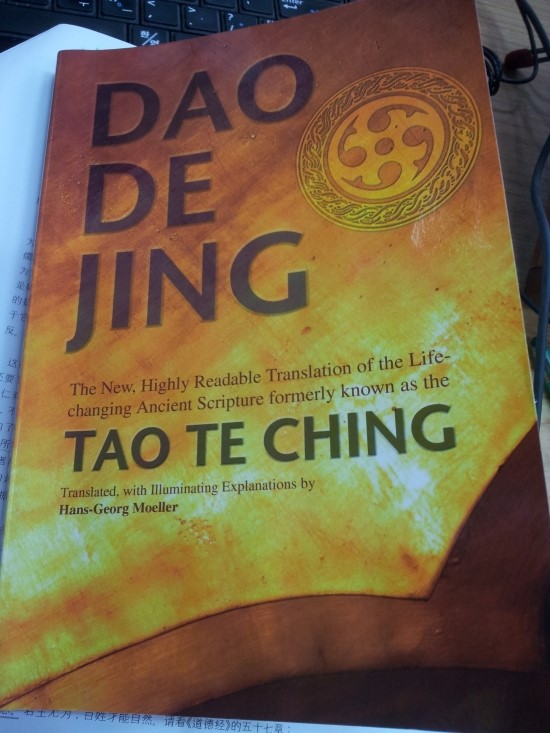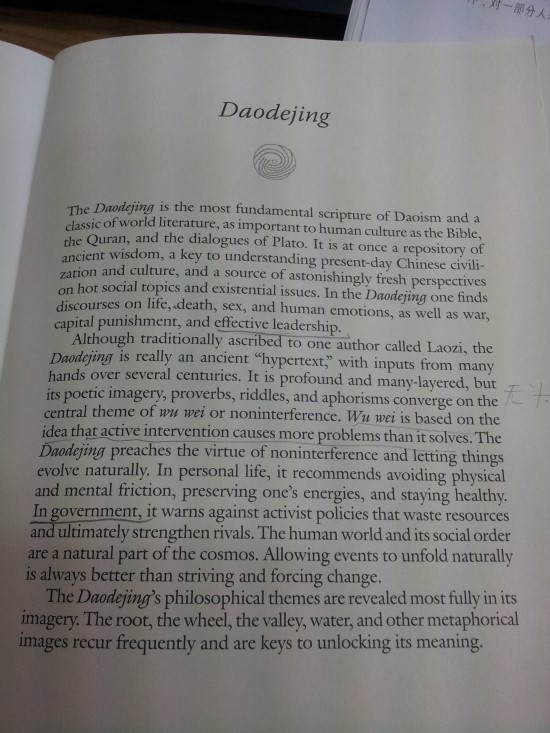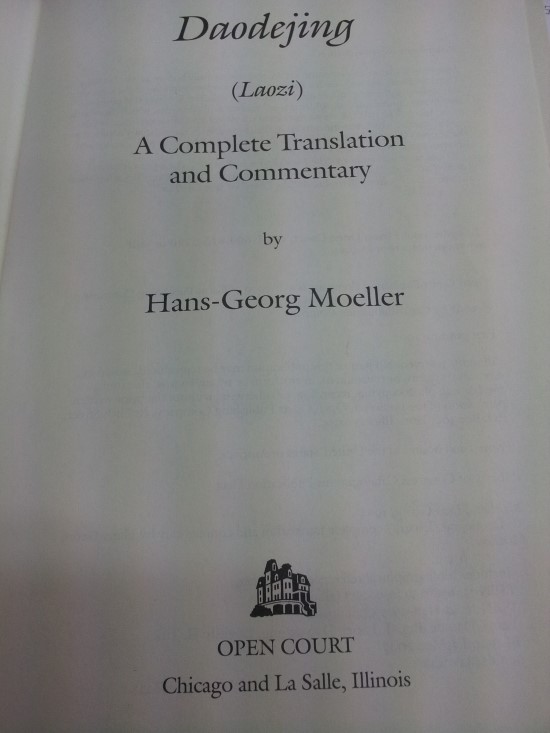나의 노자 독서기
한스 게오르그 묄러

노바당
2013. 11. 29. 16:28
이웃추가
본문 기타 기능
The Philosophy of the Daodejing
Hans-Georg Moeller


For centuries, the ancient Chinese philosophical text the Daodejing (Tao Te Ching) has fascinated and frustrated its readers. While it offers a wealth of rich philosophical insights concerning the cultivation of one's body and attaining one's proper place within nature and the cosmos, its teachings and structure can be enigmatic and obscure.
Hans-Georg Moeller presents a clear and coherent description and analysis of this vaguely understood Chinese classic. He explores the recurring images and ideas that shape the work and offers a variety of useful approaches to understanding and appreciating this canonical text. Moeller expounds on the core philosophical issues addressed in the Daodejing, clarifying such crucial concepts as Yin and Yang and Dao and De. He explains its teachings on a variety of subjects, including sexuality, ethics, desire, cosmology, human nature, the emotions, time, death, and the death penalty. The Daodejing also offers a distinctive ideal of social order and political leadership and presents a philosophy of war and peace.
An illuminating exploration, The Daodejing is an interesting foil to the philosophical outlook of Western humanism and contains surprising parallels between its teachings and nontraditional contemporary philosophies.About the Author
Hans-Georg Moeller is associate professor of philosophy at Brock University in St. Catharines, Canada. He is the author of three other books on Daoism, including Daoism Explained: From the Dream of the Butterfly to the Fishnet Allegory.
------------------------------------------------------------------
INTERVIEW WITH HANS-GEORG MOELLER, AUTHOR OF THE PHILOSOPHY OF THE DAODEJING
COLUMBIA UNIVERSITY PRESS
 In The Philosophy of the Daodejing Hans-Georg Moeller presents a clear and coherent description and analysis of this vaguely understood Chinese classic. In this interview he compares it to other religious texts and discusses different ways or reading and interpreting the text.
In The Philosophy of the Daodejing Hans-Georg Moeller presents a clear and coherent description and analysis of this vaguely understood Chinese classic. In this interview he compares it to other religious texts and discusses different ways or reading and interpreting the text.Q: When it comes to weighty philosophical works, how does the Daodejing rate?
Hans-Georg Moeller: It can be compared with the Bible, the Koran, Plato's works, etc.—it's definitely up there—it is a source of "ancient wisdom" and, moreover, a key to understanding Chinese civilization and culture today. As a "world classic" its relevance is, however, not limited to a specific time and place—it addresses topics that are of global importance. The Daodejing allows, for instance, for astonishingly fresh perspectives on perennial "existential" issues such as life and death, sex, and human emotions, but also on such "hot" social topics as war, the death penalty, and even the new media such as the Internet.
Q: This seems pretty broad.
HGM: That's because it is. The main stratagem advocated in the Daodejing is the maxim of wu wei or non-interference. This means that by active intervention one normally causes more unforeseeable problems than one initially intended to solve. The situation in Iraq is an obvious example. An "activist" approach to government, policies, and war, leads to an expenditure of energies and resources and weakens rather than strengthens the position of the aggressor. It is far better to deal with threats and emerging disorder by evasion and concentration of one's own strengths and energies.
Q: So this seems like the Daodejing would support isolationism?
HGM: Well, the term "isolationism" is probably too negative. The Daodejing presents a political scenario in which small communities live peacefully side by side without any intention to interfere in their neighbor's affairs. That seems not to be so different from the cosmopolitan ideal that the country I live in, Canada, likes to have of itself. First and foremost, the Daodejing is a book on preserving peace, social order, and sustainable success. This can be applied not only to politics and war, but also to other social and personal issues. It advises the leader to let things evolve "naturally" rather than attempting to force them. In personal life, for instance regarding sexual and emotional activity, it is concerned with how to preserve one's energies and to stay healthy. A healthy lifestyle is one that avoids friction—both physically and mentally. Being the chair of a university department, I came to appreciate how difficult and important a task it is. I personally like the line about the problem of deeming things "fortunate" or "unfortunate" in chapter 58 of the Daodejing. A Daoist story about "the old man at the fort" (that I discuss in my book) explains this very well: A man loses his horse and people say: "Oh, how unlucky you are." He says: "I don't know if this is unlucky or not." Later the horse comes back with a whole herd of fine horses and people say: "Oh, how lucky you are." He says "I don't know if this is lucky or not" and a few days later his son breaks his legs when falling off of one of the new horses. The story goes on with an additional twist. In fact, we all too easily get excited and lose our emotional calm simply because we prematurely judge things to be fortunate or unfortunate—and vainly try to act on them rather then letting things run their "natural" course.
Q: The Daodejing seems quite exotic when you compare it to some of our "Western" sensibilities.
HGM: Sometimes, I feel like there is hardly anything exotic anymore in our globalized world, but the Daodejing introduces valuable alternatives to "Western" modes of thinking that are becoming increasingly relevant in a "postmodern" and "post-colonial" society. The Daodejing does not resist globalization. In fact, when a "postmodernist" turns towards plurality and away from being concerned with "essences," that is quite Daoist in nature. Daoism does not advocate a specific belief or ideology and is quite adaptable to any culture, time, or activity. It is certainly non-fundamentalist in nature and thus more suitable to a globalized world than any exclusive religion or missionary political belief.
Q: How does Daoism differ from Western religions?
HGM: The Daodejing is not concerned with anything "beyond" or "transcendent" such as a God or "absolute" values such as truth, the good, etc. Unlike many Western philosophies and religions, Chinese philosophy and Daoism were not so much concerned with finding out what was "true" but with finding out how to act effectively and efficiently so that order in society can be established and that one can lead a healthy and content life. Daoism is thoroughly "this-worldly." There is no external creator or force, the world is rather a self-generating and self-regenerating (autopoietic) process. For the Daodejing, the world is an ongoing process of reproduction—and it does not ask the question if the chicken or the egg came first. This is perhaps the most striking "metaphysical" difference between Daoism and dominating Western philosophies and religions. Another difference is the value it ascribes to the human species. Christianity, for instance, believes that the human being is the crown of creation and was created as the image of God. In a secularized form, the Enlightenment has preserved the humanist essence of Christianity: it is commonly held that human beings have an ultimate value in themselves, have free will, and can creatively shape a humane society and the world. The Daodejing, however, sees the human world as embedded in a larger nature or cosmos and does not single out some specific human nature. In this respect, it is quite similar to contemporary "deep ecology." Humans are not essentially different from everything else that comes into being and perishes. Daoism looks at ethics, politics, and even sexuality from a non-anthropocentric perspective. There are no specific human values. Good is rather that which preserves life and not only human life but all life: plants and animals, and everything else included. The most important aspect of social order is that it does not disturb the natural order. Even sexuality is free of any specific human values (like "love," "sin," "satisfaction," or "erotics"). It is rather the way of nature—and by no means only of humans—to procreate itself. The Daodejing is also opposed to the dominating political view that government can or should be "by, of, and for the people." The presently living people are only a relatively minor factor in the world as a whole. A good government should also take into account those who have no voice or vote: children and future generations, for instance, and all the non-human forms of life. From a Daoist perspective, democracy, as it is presently practiced, is by no means an all-inclusive form of government. The contemporary American philosopher Richard Rorty makes a not so un-Daoist point when he advocates an expansion of solidarity that extends beyond those who presently have voting rights. It is now often held that we live in a post-humanist world. If so, then the non-humanism of Daoism gains a new and astonishing relevance in our times. China, the place where the Daodejing comes from, is a fascinating country and in many respects an alternative to Western civilization. It has undergone an incredible development and is the newly emerging world power. Just as China has immensely gained in political and economic relevance so will its philosophies gain in intellectual relevance. The age of "Westernization" may be followed by an age of "Chinaization"—and Daoism may be well part of this.
Q: Is that so? What kind of changes should we be expecting?
HGM: For starters, humans are not at the center of the world. The Daodejing confronts us with a non-humanist view of the world, particularly when it comes to ethics, politics, and nature. It is often in striking opposition to commonly held beliefs in the West about ourselves and the world. Perhaps our humanist values are too good to be true. Perhaps our humanist ethics of "intervention" does actually more harm than good. Perhaps our self-aggrandizing notions of "democratic" politics do not correspond to the facts. Perhaps our human-centered view of nature prevents us from adequately living with it. These are things that we would have to consider and should probably be considering right now.
Q: Then, we should all go out and pick up a copy of the Daodejing?
HGM: Yes, but you should pick up a copy of my book as well. The Daodejing is read a lot and often translated, but seldom understood. It remains "mysterious" to many readers because it consists of very dense and terse poetry. This poetic and cryptic style is reminiscent of divination formulae, proverbs, riddles, and religious and philosophical aphorisms. One needs to understand Chinese culture and philosophy to put it into context and make sense of it. My book makes the Daodejing accessible and relates it to current social and philosophical issues. When the Daodejing says, for instance "It is upon bad luck that good luck depends. It is on good luck that bad luck depends." Who knows where it ends? Then, it helps a lot if you put these lines in the context of the story of "the old man and the fort" that I mentioned before. This in turn allows you to read the short saying as a defense of equanimity and to connect it with problems in life that everyone faces even today. Another reason why the Daodejing is difficult to read on its own is its complicated history. It was compiled from traditional oral sources over a long period of time, and it doesn't have an identifiable time and place of origin or an identifiable author. It is, in a sense, a "hypertext" like the Internet because many non-identifiable people or sources contributed to it, it changed continuously, and it was not written in a linear, sequential manner; therefore, one needs a different reading strategy, a different hermeneutics than with "normal" books.
Q: How do you unlock the Daodejing?
HGM: I go into the imagery of the book (the root, the wheel, water, etc.) and explain their philosophical significance. The image of the wheel, for instance, consisting of the "full" spokes circling around an "empty" hub, illustrates how a scenario works best, namely when it is organized around an inactive, non-interfering center. On the basis of this image you can decipher many other images, such as the bellows, the valley, etc. which are also based on central emptiness and surrounding fullness. I treat the images that connect the chapters of the book like "links" that connect the websites of the Internet. One cannot really make sense of the Daodejing if one reads it chapter by chapter, one after the other, from beginning to end. Now that we have the Internet we are getting more used to "non-traditional" ways of reading. As with the Internet, when reading the Daodejing, one has to be flexible and to be able to jump from "site to site," i.e. from image to image, from metaphor to metaphor. This is a new approach and I show in my book how the lines and verses of the Daodejing are interconnected and often closely related in meaning. In this way, I read the book as a philosophical treatise on how to do things well and be successful in politics, in personal life, and in living within nature.
---------------------------------------



Daodejing: The New, Highly Readable Translation of the Life-Changing Ancient Scripture Formerly Known as the Tao... by Laozi and Hans-Georg Moeller (May 28, 2007)
